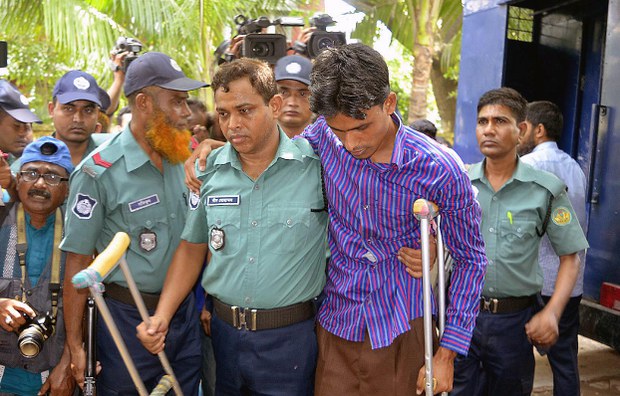Bangladesh: 2 Militants Sentenced to Death for Professor’s Murder
2018.05.08
Dhaka
 Bangladeshi police escort Masqawat Hasan before he was sentenced to death for the murder of a university professor, Rezaul Karim Siddique, in the northwestern city Rajshahi, May 8, 2018.
Bangladeshi police escort Masqawat Hasan before he was sentenced to death for the murder of a university professor, Rezaul Karim Siddique, in the northwestern city Rajshahi, May 8, 2018.
A court in northwestern Bangladesh sentenced two militants to death Tuesday after convicting them in the murder of a professor who was killed in a machete-attack near his home two years ago, a prosecutor said.
The court in Rajshahi also handed life terms to three other suspected members of the banned militant group Jamaat-ul Mujahideen Bangladesh (JMB) who were found guilty of aiding the murder of Rezaul Karim Siddique on April 23, 2016.
The slaying of the 58-year-old professor, who taught English literature at Rajshahi University, occurred toward the end of a spate of killings in Bangladesh carried out by Muslim extremists who targeted secular bloggers, intellectuals and foreigners between October 2015 and April 2016. Most of the victims were hacked to death with machetes.
Prosecutor Entazul Haque Babu told BenarNews that one of the two men sentenced to be hanged for Siddique’s murder was Shariful Islam, one of the victim’s students at Rajshahi University. Islam is still at large.
He said the three men who were sentenced to life in prison – Rahmat Ullah, Abdus Sattar and his son, Ripon Ali – were in police custody.
“The court said professor Siddique was killed for his non-communal way of life and ideology,” Babu said, without elaborating.
Court documents said that before Siddique’s murder, Islam had threatened the professor in his classroom, saying “a caliphate must be established in this country.”
The extremist group Islamic State (IS), in a statement, said it was behind Siddique’s killing and accused him of being an atheist. But his daughter, Rizwana Hasin Shotovi, told BBC News that he believed in God.
Bangladeshi officials have rejected the IS claim, saying the group does not exist in the country, and instead blamed homegrown militants for recent terrorist acts in Bangladesh.
Police believe Siddique may have been targeted by extremists because he was involved in cultural activities. Court documents said he had been trying to start a music school at his village in Rajshahi’s Bagmara sub-district, where the JMB began operating in 2001.
Siddique also served as an editor of a literary magazine Komolgandhar and he also worked as an adviser to a cultural organization known as Sundaram, investigators said.
The JMB founder, Shaikh Abdur Rahman, and his military wing chief, Suddiqul Islam, spread terror in Bagmara and adjacent areas by staging witch-hunts, executing people in public and hanging their victims upside down, authorities said.
But the government shattered JMB’s organizational network by executing Rahman and Suddiqul Islam after convicting them in the killings of two assistant judges.
In November 2016, a court in northern Bangladesh also indicted seven suspected JMB members for the October 2015 killing of farmer Kunio Hoshi, a Japanese farmer living in in Rangpur district, some 300 km (185 miles) from Dhaka. The 66-year-old Hoshi had been working for two months as an agricultural researcher before being gunned down by two suspects on a motorbike.
Students, family members react to verdict
Authorities had earlier identified eight people as perpetrators in Siddique’s murder, but police said three had already been killed in “gunfights” with law-enforcement officials in recent months.
Before the court issued its verdict, hundreds of Rajshahi University students linked arms and formed a human chain, police said.
“He sacrificed his life for his non-communal way of life and ideology,” Abdullah Al Mamun, one of the slain professor’s students, told BenarNews. “His martyrdom inspires us.”
|
Rizwana Hasin Shotovi, Siddique’s daughter, said she was “satisfied” with the verdict, but expressed concern that the main culprit was still on the run. |
“We hope the higher courts would uphold this judgment and [the two culprits] would be executed soon,” she told BenarNews.







